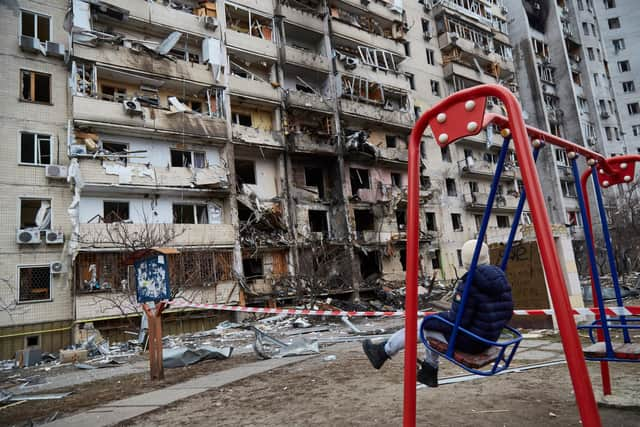Ukraine-Russia conflict: How to talk to children about the crisis in Ukraine
With Vladimir Putin threatening to escalate an already chaotic situation by putting Russia’s nuclear forces on high alert, fears the crisis could lead to a third world war are being voiced far and wide across television, radio, newspapers and social media.
If the rapidly changing conflict has left many adults anxious and fearful, the impact on youngsters is also a cause of growing concern, especially due to the grim fact that Russia’s invasion has already brought death and trauma to children across Ukraine.
Advertisement
Hide AdAdvertisement
Hide AdAs of Sunday, at least 14 children were among 352 civilians who had been killed, according to the country's health ministry. The first to be named was Polina, who was in the final year of primary school in Kyiv. According to the city's local authority, she and her parents were shot dead by a Russian sabotage and reconnaissance group on a street in the north-west of the capital.
With such harrowing stories dominating the news agenda, children’s charities, psychologists and counselling experts said it was more important than ever to find a way to allow children here to express their feelings and, if possible, answer their questions.
Ane Lemche, a psychologist and child counsellor with Save the Children, said youngsters around the world might struggle to understand what is happening in Ukraine, and may have questions about the images, stories and conversations they are exposed to.
But she stressed the worst course of action open to parents and carers was to simply shut down all and any queries children may have in a misguided attempt of protecting them.
“What is happening in Ukraine can be frightening for both children and adults,” explained Ms Lemche. “Ignoring or avoiding the topic can lead to children feeling lost, alone and more scared, which can affect their health and wellbeing.


“It is essential to have open and honest conversations with children to help them process what is happening.”
She said children should be given the space to talk, with the conversation tailored to their age and maturity. “When children have the chance to have an open and honest conversation about things upsetting them, it can create a sense of relief and safety,” she explained.
Ms Lemche also emphasised the need to remind children “this is not their problem to solve”, adding: “They should not feel guilty about playing, seeing their friends, and doing the things that make them happy.”
Advertisement
Hide AdAdvertisement
Hide AdOne positive response, she went on, was to support children who want to help, whether by creating fundraisers, writing to decision makers, or producing drawings and paintings calling for peace.
Another leading children’s charity Barnardos said in the absence of factual information, children may perceive the situation to be far worse than it is, and pointed out that while some youngsters might be feeling scared, others may not be worried at all.
It pointed out young children in particular often personalise situations and may perceive the danger to be closer to home.
“Let them know that although war is very serious, they do not need to worry about it happening in their neighbourhood,” the charity advised.
“Tell them you understand how they are feeling and reassure them that they are safe and that you are there to take care of them. It is important, however, to be realistic and not to promise that no one will get hurt.”
The charity also said some children may not be able to talk about their feelings or concerns, and should instead be supported to make sense of the world through play.
Professor Vivian Hill, vice-chair of British Psychological Society’s division of educational and child psychology, pointed out children and young people have already experienced “an incredibly difficult two years” due to the coronavirus pandemic, and now face “an even more uncertain world”.
Her advice includes providing “honest answers” to the questions they may raise, with the best responses simple and rooted in basic facts.
Advertisement
Hide AdAdvertisement
Hide AdShe also said it was important to avoid exposing them to a “constant stream of news”, and to guard against children falling victim to disinformation.
“We know that fake news is an issue, particularly on social media sites, so be mindful of what your children are absorbing and where they are getting it,” she said.
Dr John Wilson and Jill Attree from Grief Specialists, a professional support network whose members include grief coaches and therapists, also said it was not realistic to protect children from everything sad or frightening in life.
“What we can do is give them the right tools to deal with emotional pain and feelings of loss of safety and control – or put another way, feelings of grief,” they explained.
“You’ll have to make a judgement about your children’s maturity and ability to understand without giving them nightmares and talk to them where they are at.
“However, tell the truth about your feelings and go first, which will then make it safe for your children to talk honestly too.”
Their advice includes avoiding comparing the lives of children here with those in Ukraine, given that such a process “minimises their feelings”.
Instead, they said children should be allowed to share their emotions without judgement or criticism, and suggested parents and carers tell them that they don’t have all the answers. “Don’t lie,” they said.
A message from the editor:
Thank you for reading this article. We're more reliant on your support than ever as the shift in consumer habits brought about by coronavirus impacts our advertisers. If you haven't already please consider supporting our trusted, fact-checked journalism by taking out a digital subscription.
Comments
Want to join the conversation? Please or to comment on this article.
